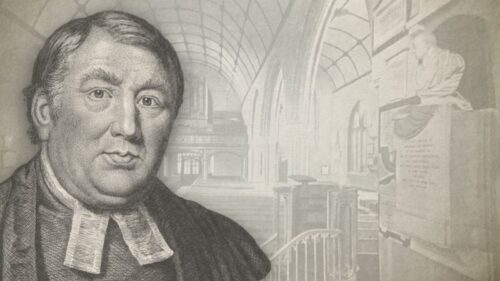
October 19—Morning Devotion
“There shall be no more thence an infant of days, nor an old man that hath not filled his days: for the child shall die an hundred years old, but the sinner being an hundred years old shall be accursed. “—Isaiah 65:20
My soul, contemplate this morning the auspicious and blessed effects brought into the circumstances of mankind by the gospel. Not only shall there be new heavens, and a new earth, but new hearts, new minds, new dispositions to enjoy them. “If any man be in Christ, he is a new creature. Old things are passed away, and all things are become new.” And among the many blessed changes that shall take place in consequence of Jesus’s salvation, all untimely deaths are done away. Indeed, there can be no such thing as an untimely death to those who are in Christ: for a voice from heaven pronounces all blessed that die in the Lord. A child new born, if born also in Christ, an ‘infant. of a day, if a gracious day, is as ripe for glory as if an hundred years had passed over him. Indeed, he is an hundred years old in Jesus. Sweet thought! what a blessedness, dearest Jesus, hath thy great salvation introduced into the circumstances of thy people. But what an awful thought—the life of an unawakened, unregenerated sinner, though protracted to an hundred years, is lengthened only to misery. As he came into the world, so he goes through it, and so he goes out of it—an unrenewed sinner. Oh distinguishing grace! Oh great salvation!
Robert Hawker (1753-1827) was an Anglican (High-Calvinist) preacher who served as Vicar of Charles Church, Plymouth. John Hazelton wrote of him:
“The prominent features…in Robert Hawker's testimony…was the Person of Christ….Dr. Hawker delighted to speak of his Lord as "My most glorious Christ.” What anxious heart but finds at times in the perusal of the doctor's writings a measure of relief, a softening, and a mellowing? an almost imperceptible yet secret and constraining power in leading out of self and off from the misery and bondage of the flesh into a contemplation of the Person and preciousness of Christ as "the chiefest among ten thousand and the altogether lovely." Christ and Him crucified was emphatically the burden of his song and the keynote of his ministry. He preached his last sermon in Charles Church on March 18th, 1827, and on April 6th he died, after being six years curate and forty-three years vicar of the parish. On the last day of his life he repeated a part of Ephesians 1, from the 6th to the 12th verses, and as he proceeded he enlarged on the verses, but dwelt more fully on these words: "To the praise of His glory Who first trusted in Christ." He paused and asked, "Who first trusted in Christ?" And then made this answer: "It was God the Father Who first trusted in Christ."
Robert Hawker on the Biblical Covenants (Complete)
Robert Hawker's Poor Man's Morning Portions





